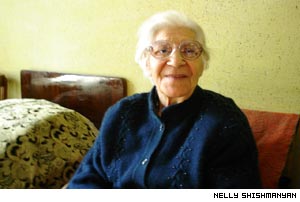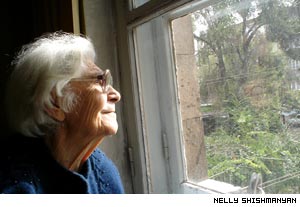I found this interesting, so I'm sharing it with you guys...

Zeynab Jauri faced death even before she knew what the word meant.
At 91, Zeynab’s memory isn’t so good, but some things cannot be forgotten
Her words were learned in her native Kurdish language. Armenians would later teach her their language – and the vocabulary would include another word, “genocide”.
Now 91, Zeynab, moves with a walking cane to her sofa in the room that is light and tidy on a gloomy autumn day in Yerevan. She begins her story:
“I can tell what I’ve heard from my relatives. In 1918 when we left our village of Yengukeh in the Kars region for the first time I was only four or five. We fled to an Armenian village, where we stayed for half a year.”
Zeynab, a Yezid (a culture of Kurds, known for their shepherding and transient lifestyle), was among those hundreds of thousands, who narrowly escaped death before she could even realize what the death is.
“In 1919 we returned to Kars. They told us the war is over, you can go back, so we piled all our things – mats, bedding, food, clothes, whatever we had, on the mules and took the way to Kars. Everything was razed to the ground. Turks were taking anything they could – pieces of houses, anything that could be taken away.”
“We stayed there a year or so, may be even less, when one evening someone came to our place and said to get ready for a refuge early in the morning. We bundled up our things on the mules again, took a wagon and left the village in the dawn.”
Zeynab and her brother and sister were placed on one of the mules hauling fleeing Armenians who’d heard war was coming to Kars.
“We reached a village,” tells Zeynab, trying to remember the name of the village. “There were so many villages we have passed, so many we have stayed in I can hardly remember the name of this one.”
Her father found work as a shepherd, taking villagers’ cattle into the fields to graze.
“One day my father did not come back, neither did the cattle,” Zeynab recalls. “The whole village went out to find the shepherd and his cattle.”
Her father was found tied to a tree and blindfolded, unable to say who had taken the cattle.
“We were escaping with the Armenians, for the Turks were killing Yezids along with Armenians. We left the village again.
“Parents were unable to save many small children and many of them were taken away by the whirlpool of the river. It was spring and the current was fast and fierce…”
Along the way, the children were separated from their parents. In Ashtarak they were taken into an orphanage. Her father found her there. But her mother had been separated too and left without finding her children. After arriving in Ashtarak, Zeynab never saw her mother again.
After two years the children were taken to Jalaloghli (now Stepanavan) orphanage and studied in the school there until 1929.
“My brother was working in a (vegetable) oil factory and got half a bottle of oil every day as salary. We would crumble bread into it and eat.
“The Bolsheviks came one day. A girl in red was standing in the street. They forced her to take the red dress off, hung the dress on a stick and declared Soviet rule. The Soviets were good for us – the orphans. They were feeding us.”

From Jalaloghli the orphans were sent to the orphanage in one of Yerevan’s old districts – Kond. Zeynab was sent to study in the first pedagogical technical school for Kurds in the Transcaucasus, in 1930.
Graduating in three years, Zeynab Jauri, a graduate with excellence, began working in the same institution as a teacher. In 1931 she got married.
During the Stalin years, Zeynab and her late husband Hajiye Jndi (also a refugee from another Yezidi village in the Kars region), a professor of linguistics in Soviet times, were persecuted. Alleged as an enemy to the people he was imprisoned, and she was fired from the technical college.
Narrowly escaping the Stalin camps Zeynab and her husband managed to gradually reset their life. Later Zeynab became the first radio anchor for a Kurdish program, and then she was tutor at a number of kindergartens in Yerevan.
“I revived the knowledge of my native language only in Armenia, in the villages near the town of Aparan, where there are many Yezids. Initially, when we first moved to Armenia we knew not a single word in Armenian and it was the people who kept us in the villages that patiently taught us Armenian.”
Zeynab has 5 daughters (the elder daughter died last year), 24 grandchildren and great grandchildren. Her face is quite, calm and enlightened as if the pain she has overcome throughout her life has not touched upon her at all.

Zeynab Jauri faced death even before she knew what the word meant.
At 91, Zeynab’s memory isn’t so good, but some things cannot be forgotten
Her words were learned in her native Kurdish language. Armenians would later teach her their language – and the vocabulary would include another word, “genocide”.
Now 91, Zeynab, moves with a walking cane to her sofa in the room that is light and tidy on a gloomy autumn day in Yerevan. She begins her story:
“I can tell what I’ve heard from my relatives. In 1918 when we left our village of Yengukeh in the Kars region for the first time I was only four or five. We fled to an Armenian village, where we stayed for half a year.”
Zeynab, a Yezid (a culture of Kurds, known for their shepherding and transient lifestyle), was among those hundreds of thousands, who narrowly escaped death before she could even realize what the death is.
“In 1919 we returned to Kars. They told us the war is over, you can go back, so we piled all our things – mats, bedding, food, clothes, whatever we had, on the mules and took the way to Kars. Everything was razed to the ground. Turks were taking anything they could – pieces of houses, anything that could be taken away.”
“We stayed there a year or so, may be even less, when one evening someone came to our place and said to get ready for a refuge early in the morning. We bundled up our things on the mules again, took a wagon and left the village in the dawn.”
Zeynab and her brother and sister were placed on one of the mules hauling fleeing Armenians who’d heard war was coming to Kars.
“We reached a village,” tells Zeynab, trying to remember the name of the village. “There were so many villages we have passed, so many we have stayed in I can hardly remember the name of this one.”
Her father found work as a shepherd, taking villagers’ cattle into the fields to graze.
“One day my father did not come back, neither did the cattle,” Zeynab recalls. “The whole village went out to find the shepherd and his cattle.”
Her father was found tied to a tree and blindfolded, unable to say who had taken the cattle.
“We were escaping with the Armenians, for the Turks were killing Yezids along with Armenians. We left the village again.
“Parents were unable to save many small children and many of them were taken away by the whirlpool of the river. It was spring and the current was fast and fierce…”
Along the way, the children were separated from their parents. In Ashtarak they were taken into an orphanage. Her father found her there. But her mother had been separated too and left without finding her children. After arriving in Ashtarak, Zeynab never saw her mother again.
After two years the children were taken to Jalaloghli (now Stepanavan) orphanage and studied in the school there until 1929.
“My brother was working in a (vegetable) oil factory and got half a bottle of oil every day as salary. We would crumble bread into it and eat.
“The Bolsheviks came one day. A girl in red was standing in the street. They forced her to take the red dress off, hung the dress on a stick and declared Soviet rule. The Soviets were good for us – the orphans. They were feeding us.”

From Jalaloghli the orphans were sent to the orphanage in one of Yerevan’s old districts – Kond. Zeynab was sent to study in the first pedagogical technical school for Kurds in the Transcaucasus, in 1930.
Graduating in three years, Zeynab Jauri, a graduate with excellence, began working in the same institution as a teacher. In 1931 she got married.
During the Stalin years, Zeynab and her late husband Hajiye Jndi (also a refugee from another Yezidi village in the Kars region), a professor of linguistics in Soviet times, were persecuted. Alleged as an enemy to the people he was imprisoned, and she was fired from the technical college.
Narrowly escaping the Stalin camps Zeynab and her husband managed to gradually reset their life. Later Zeynab became the first radio anchor for a Kurdish program, and then she was tutor at a number of kindergartens in Yerevan.
“I revived the knowledge of my native language only in Armenia, in the villages near the town of Aparan, where there are many Yezids. Initially, when we first moved to Armenia we knew not a single word in Armenian and it was the people who kept us in the villages that patiently taught us Armenian.”
Zeynab has 5 daughters (the elder daughter died last year), 24 grandchildren and great grandchildren. Her face is quite, calm and enlightened as if the pain she has overcome throughout her life has not touched upon her at all.

